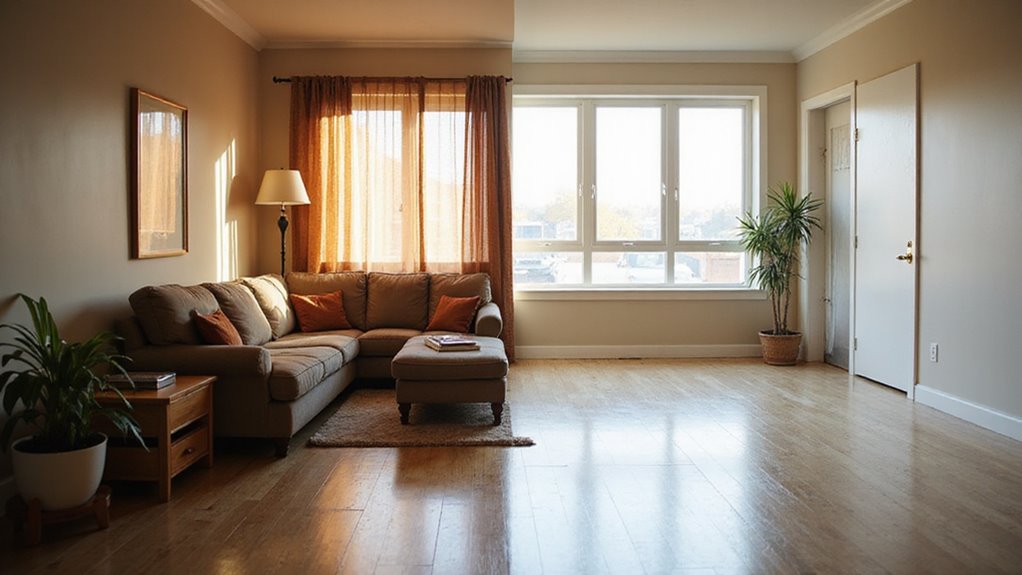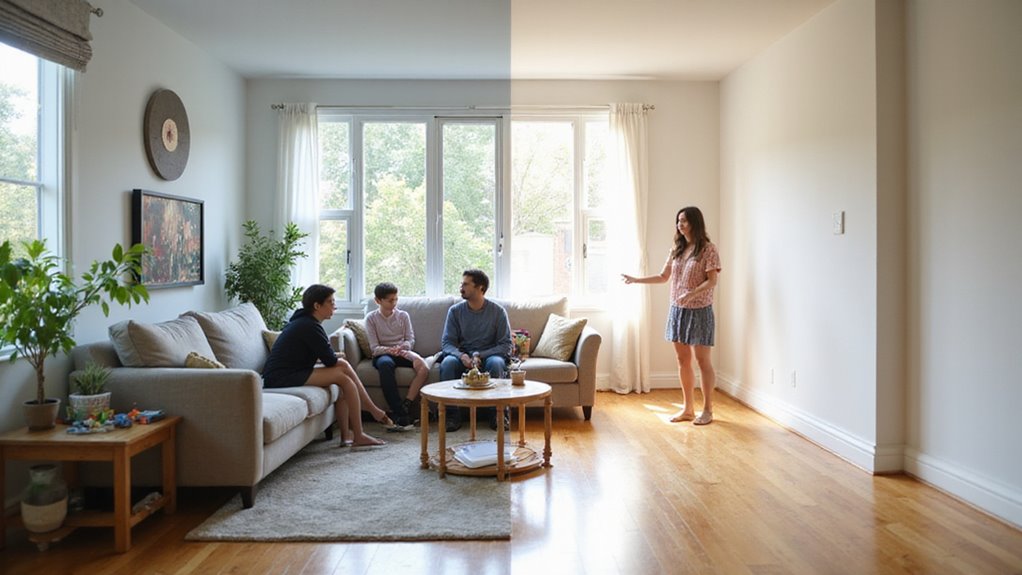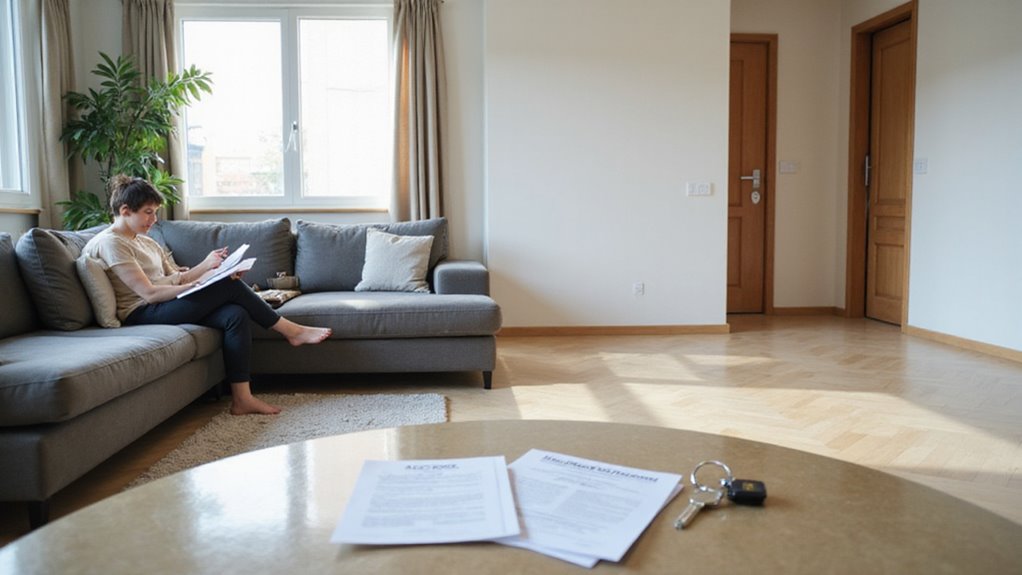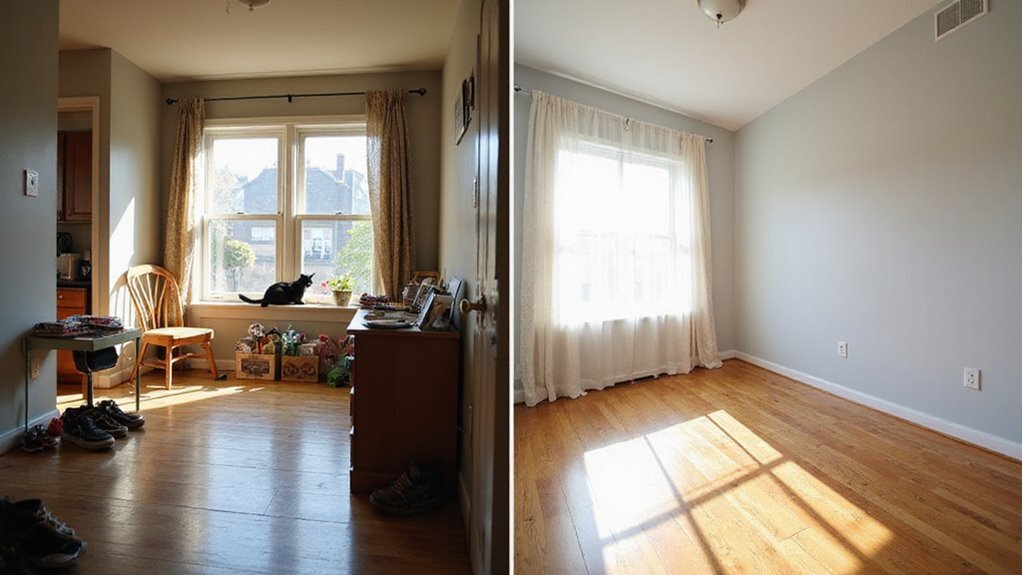Deciding whether to sell your rental property with tenants or after it becomes vacant is a tough choice for landlords. Each option affects your profit, timeline, and the type of buyers you attract. The wrong move could cost you time and money.
This decision can create stress and uncertainty. You may worry about losing rental income or facing angry tenants. You might also fear longer vacancy periods or lower offers from buyers.
The best choice depends on your goals, the market, and your willingness to manage complications. Understanding the pros and cons of each approach is key. Careful planning can help you avoid costly mistakes. This blog will break down both options so you can choose the best path for your situation.
Key Takeaways
- Selling occupied properties offers steady rental income and appeals to investors, but showings are harder to schedule and tenant cooperation is required.
- Vacant properties are easier to stage, show, and repair, attracting owner-occupant buyers, but risk higher insurance costs and security issues.
- Occupied homes can command higher prices from investors seeking immediate cash flow, while vacant homes often appeal to buyers wanting to move in or renovate.
- Vacant homes typically sell faster due to easier access and presentation, but may lose rental income during the listing period.
- Tenant-occupied sales face longer market times and limited staging options, but provide financial stability until closing.
Understanding Your Selling Goals

Before you decide how to sell your rental property, set clear selling goals. Your goals will determine your selling strategy. Decide if you want a fast sale, the highest price, or less trouble for tenants.
Your priorities affect your pricing choices. If price matters most, check recent sales for both vacant and occupied rentals nearby. Market data may show that vacant homes often sell for more, but occupied homes provide steady income. In some cases, the current market value of your property can shift quickly depending on local demand and inventory.
Review local vacancy rates and study buyer demand. If the market is slow, occupied homes may take longer to sell. Use this information to match your selling plan to your goals.
To achieve a fast sale, consider finding a cash buyer with a solid reputation who can offer a fair price and quick closing, especially if you are in a difficult financial or personal situation.
Attracting Different Types of Buyers
Different buyers look for different things in rental properties. Investors often want occupied homes because they offer steady income right away. Owner-occupants usually prefer empty homes so they can move in or renovate on their own schedule. The optimal selling months for your property may shift depending on the type of buyer you want to attract and the seasonality of your local market.
Occupied properties may sell faster to investors, especially if the tenants pay rent on time. If a property is vacant, it might attract more people who want to live there themselves. Zoning rules also affect who might buy your property.
Multi-family zoning usually attracts investors looking for rental income. Strict single-family zoning can limit buyers to those wanting a home to live in. If you know your local zoning and market trends, you can better target the right buyer.
Highlighting unique features can make your property more appealing to investors or cash buyers, even if it’s currently occupied.
Maintaining Cash Flow During the Sale

You’ll want to assess how tenant rent income can stabilize your cash flow throughout the sales process, especially since vacancy periods directly impact your bottom line. Analyzing average vacancy losses—often 5-10% of annual rental income—helps quantify potential profit erosion. When selling an inherited property, understanding the step-up in basis can also be crucial for evaluating the true after-tax profit from your sale.
Evaluate your lease terms and tenant flexibility, as longer leases may appeal to income-focused buyers but limit your ability to negotiate a vacant sale if needed. Additionally, understanding property lien search procedures can help you avoid unexpected financial obligations that might disrupt your anticipated cash flow during the sale.
Tenant Rent Income Continuity
Keeping tenants in your rental property during a sale helps maintain steady rental income. This ongoing cash flow can cover your mortgage, taxes, and other expenses. If you want to avoid gaps in income, selling with tenants is a good option.
Properties with tenants often attract investors looking for immediate returns. This can make your property more appealing and speed up the sale. If continuous rent is important, tenants in place provide financial stability during the process.
A seamless transfer of rental payments to the new owner is possible if tenants stay. This may strengthen your position in negotiations. If you want to reduce financial pressure, consider selling with tenants in place.
Vacancy Impact on Profits
A vacant property can quickly reduce your profits. You lose rental income and must pay the mortgage, taxes, and utilities yourself. If vacancies last long, your yearly returns may drop by 6-10%.
High-demand markets may help you sell faster, reducing your losses. In slow markets, longer vacancies can cut into your profits more deeply. Buyers might also think a vacant home has problems or is less desirable.
If the market is uncertain, you must balance the loss of rent with the chance of a higher sale price. Consider how long you can afford to keep the property empty. Weigh your options carefully to protect your financial return.
Lease Terms and Flexibility
Lease terms with flexibility help keep cash flow steady during the sale of a property. Owners can offer short-term or month-to-month leases to appeal to buyers who want flexible occupancy options. Flexible leases often lead to higher occupancy rates during ownership changes.
If the property falls under rent control, owners may face limits on rent increases and tenant removals. These restrictions can affect your ability to negotiate with buyers. Lease extensions, if allowed, help maintain rental income and attract buyers who want stable cash flow.
Owners should check local laws before changing lease terms. Balancing lease flexibility with legal rules makes the property more appealing to buyers. Proper planning ensures steady income and increases the property’s value during a sale.
Impact on Property Showings

You’ll face more scheduling hurdles when showing an occupied property, as 63% of sellers report difficulties coordinating with tenants. Studies also show that tenant-occupied homes average longer days on market, often due to inconsistent presentation and limited staging control. If you want maximum flexibility and optimal showing conditions, a vacant property gives you the upper hand.
Buyers, especially those considering a quick close, may also scrutinize whether you’re working with legitimate cash house purchasing companies to ensure the sale process won’t be delayed by third-party financing or unreliable buyers. Ensuring a clear title before listing, whether the property is occupied or vacant, can also prevent legal delays and provide confidence for both buyers and sellers during the showing and sale process.
Scheduling Flexibility Challenges
Scheduling showings is harder when a rental is occupied. Landlords must follow legal rules and give tenants notice, often 24 to 48 hours. This limits how quickly and easily showings can be arranged.
If tenants have busy schedules, you may face delays or fewer available time slots. This can reduce the number of buyers who can view the property. Properties with fewer restrictions are often shown more and sell faster.
Virtual tours can help, but they do not fully replace in-person visits. Staging is also harder when tenants are present. You may not be able to present the property at its best during showings.
Tenant Impact on Presentation
Tenants living in a property can affect how well it shows to buyers. Their belongings and habits may make the home look less appealing. This can lower buyer interest and final sale price.
Clutter, personal items, and cleanliness are the main concerns. If tenants feel uncomfortable, they may not cooperate during showings. Lease rules mean you must give proper notice before entering or making changes.
If the property is occupied, you cannot always present it in the best way. Vacant homes are easier to clean and stage for buyers. This can lead to quicker sales and higher offers.
Tenant Cooperation and Relations
Tenant cooperation is important when selling a rental property with occupants. Cooperative tenants make showings smoother and can help the property sell faster. Listings with helpful tenants may spend 10–20% less time on the market. Clear communication with tenants about your plans and schedule is key. You can offer incentives like rent discounts or flexible move-out dates to encourage their help. Lease changes may also reduce problems and build trust. If tenants share feedback, use it to spot issues early.
Addressing concerns quickly can prevent delays in the sales process. Buyers feel more confident when tenants are cooperative, which may lead to better offers. Taking time to discuss tenant concerns and preferences with your occupants can further minimize disruptions and foster a smoother sales experience. It’s also crucial to ensure that legal ownership is verified before proceeding with a sale, as unresolved disputes or unclear rights can complicate tenant relations and the overall selling process.
Legal and Lease Considerations

The lease agreement controls what you can do when selling a property with tenants. Most states require you to follow the current lease terms. If you do not, you risk legal trouble.
A fixed-term lease means the tenant can stay until the end of the lease. If the tenant has a month-to-month lease, you can ask them to leave with proper notice. The required notice is usually 30 or 60 days, depending on local laws. You may also need to disclose any Residential Property Disclosure Form information to buyers, so they are aware of issues or conditions related to the property.
You must tell potential buyers about any lease details. Buyers need this information to decide if the property fits their plans. If you understand your lease agreements, you can avoid delays and legal issues.
Working with an attorney ensures you address clear title and escrow requirements and comply with all legal obligations when selling an occupied property.
Marketing Challenges and Opportunities
You’ll face distinct marketing dynamics based on whether the property is occupied or vacant—occupied units often attract investor buyers, while vacant homes appeal to owner-occupants. Data shows staged or empty properties typically photograph better, helping you showcase potential, but access for showings is far easier when tenants aren’t present. Balancing these factors is essential to maximize exposure and streamline the sales process.
Additionally, a well-presented home can attract more interest and potentially command a higher selling price, making preparation a key consideration in your marketing approach. If the property is inherited, keep in mind that court approval required may delay your ability to sell until probate is complete, which can impact your marketing timeline.
Attracting Investor Buyers
Attracting investor buyers means showing why your rental property is a good investment. Investors want to see strong income and easy management. If your property meets these needs, it will get more attention.
Clear rent rolls and expense statements help investors see steady cash flow. You should also share details about occupancy rates and neighborhood trends. If these numbers are positive, your property will stand out.
Investors often consider different types of loans. You can outline options like conventional, portfolio, or DSCR loans. Flexible financing can attract more buyers and make your property easier to purchase.
If you focus on income, financing, and clear records, investors will see the value. This approach helps your property compete in a busy market. You give buyers the facts they need for a confident decision.
Showcasing Property Potential
The way you present your rental property affects how buyers see it. Staging helps buyers imagine living there and increases interest. If you stage the property, you highlight its strengths and make it more appealing.
A vacant property makes staging and marketing easier. You can use professional photos and virtual tours without tenant belongings in the way. This approach attracts both investors and people looking for a home.
If the unit is occupied, staging options are limited. Personal items or clutter may distract buyers. This situation can make it harder to show the property’s true value.
Coordinating Tenant Access
Coordinating tenant access means managing how buyers see a rental property when someone is living there. This can be hard because tenants want privacy, but buyers need to visit. If access is limited, fewer buyers may come, and selling could take longer.
A National Association of Realtors survey found that 45% of buyers struggle with showings in tenant-occupied homes. This makes scheduling visits a common problem. Sellers may lose interested buyers if showings are difficult to arrange.
Virtual tours can help solve this issue. If you use high-quality photos and videos online, buyers can view the property anytime. This reduces the need for frequent in-person visits and attracts more potential buyers.
If tenants cooperate, marketing becomes easier. Combining technology with tenant support creates more opportunities to sell. This approach can help even when access is limited.
Pricing Strategies for Occupied Versus Vacant Properties
Occupied and vacant rental properties need different pricing strategies. Buyers see value in both, but each type attracts different buyers. Pricing should match the property’s occupancy status and local market trends.
Occupied properties offer immediate rental income, which appeals to investors. If the property has tenants, you can often ask for a higher price. Compare with recent sales of similar tenant-occupied properties nearby.
Vacant properties usually attract buyers who want to move in or investors who want flexibility. If the home is empty, buyers may expect it to be ready for quick move-in. You might need to offer a small discount if the property is vacant or needs updates.
If local vacant homes take longer to sell, you should adjust your price to avoid long market times. Check current sales data to guide your decisions. Using clear market data helps you set the best price for any rental property. When evaluating your pricing strategy, consider how competitive pricing techniques can help you position your property advantageously compared to similar listings.
Appeal and Presentation of the Property

The way a property looks can affect how fast it sells and for how much. Vacant homes are easier to show and improve, which can help them sell faster. If you want the highest price, a vacant home usually gives you more control over its appearance.
Occupied homes can be harder to stage or repair because of tenants’ privacy and lease rules. If tenants keep the home clean and tidy, buyers can see its potential. Poor upkeep by tenants can turn buyers away or lower the offers you receive.
Showings in occupied homes must fit the tenant’s schedule, which can limit when buyers visit. Limited access may reduce buyer interest and slow down the sale. If you can work well with tenants, the process may still go smoothly.
Timing and Flexibility in the Sale Process
Timing and flexibility are very important in the property sale process. A smooth sale depends on how easily buyers can see the home. Any delays or limits can slow things down.
Selling a rented property means working around the tenant’s schedule. You must give legal notice before showings and respect tenant privacy. These rules can make scheduling harder.
Vacant properties are easier to show to buyers. Agents and buyers can visit at any time, which speeds up offers and inspections. Industry data shows vacant homes sell 20–30% faster.
If a tenant is uncooperative or has a strict schedule, you may face delays. Buyers may lose interest if they can’t see the property easily. Flexibility helps keep the sale moving forward.
Controlling the timeline is easier with a vacant home. Sellers can quickly respond to buyer requests and changing market trends. This control often leads to a faster, smoother closing.
Managing Repairs and Upgrades
Managing repairs and upgrades is important when selling your rental property. Repairs and upgrades can affect how quickly your property sells and at what price. Well-maintained homes often sell faster and for more money. Repairs and upgrades can boost your rental property’s value and help it sell faster when it’s time to list.
Occupied units need repairs scheduled with tenants, which can slow the process. If tenants live there, repairs may take 20-30% longer. You must plan work around their schedules.
Vacant units allow you to finish upgrades and staging faster. If the property is empty, there are no tenant restrictions. This can help attract more buyers.
Bundling repairs while the unit is vacant can save on labor costs. If you do all work at once, you may spend 15% less. Staggered repairs usually cost more.
Updated and staged homes look more appealing to buyers. If the property looks new, buyers may pay a higher price. Proper upgrades can help justify your asking price.
Risks of Vacancy and Property Security
When your property sits vacant, you’re 60% more likely to experience a break-in, according to FBI statistics. Unoccupied homes also face higher risks of unnoticed maintenance issues, which can intensify costs quickly. Plus, many insurers impose stricter terms or higher premiums on vacant properties, making comprehensive coverage harder to secure.
Increased Break-In Vulnerability
Vacant rental properties attract more break-ins because they appear unprotected. Thieves target empty homes since no one is there to stop them. This makes your property more likely to be robbed.
If a property is vacant, there is no one to notice strange activity or call for help. Uncollected mail and dark windows can show that nobody is home. Criminals look for these signs as an easy opportunity.
Damage or theft may go unnoticed for days if you do not check the property often. Insurance companies see more claims from vacant homes. If you plan to leave a property empty, you should know these risks.
Maintenance Oversight Risks
Vacant properties are at higher risk for maintenance problems. Small issues like leaks or pests often go unnoticed without regular occupants. These problems can quickly become expensive repairs.
Industry data shows vacant homes are 60% more likely to need major repairs than occupied homes. If you skip frequent inspections, you may miss early warning signs. Missed maintenance can lower your sale price and delay your sale.
Regular inspections can help catch problems early. However, organizing these checks takes time and effort. Inspections help, but they may not replace the care that tenants provide.
Insurance Coverage Challenges
Insurance companies often see empty rental homes as risky. This can make it harder to get the coverage you need when selling. If you plan to sell a vacant property, you should know about these insurance issues.
Vacant homes usually cost more to insure. Insurers may raise your rates by up to 50% due to higher risks. If the property stays empty, you could also face limited coverage.
Most standard policies do not cover problems caused by vacancy, such as water damage or theft. If your home is empty for too long, insurers might cancel your policy. Some companies will not renew coverage until someone moves in.
Certain insurers may require added security for empty homes. You might have to install alarms or extra locks to keep coverage. If you cannot meet these demands, your policy could be at risk.
Financial Implications and Potential Losses
Selling a rental property can affect your finances in several ways. If the property has tenants, you will still receive rent, which helps cover costs. If the property is vacant, you may lose rental income but could attract more buyers.
Buyers looking for a home to live in often prefer vacant properties. If your property is occupied, some buyers may offer a lower price. Selling during a strong market can help you get a better price, but waiting too long may lead to losses.
Tax rules also play a role. If tenants remain, you can keep claiming deductions until the sale. Choosing when and how to sell affects your profits and possible losses.
Streamlining the Closing Process
To close a sale quickly, you must understand how occupancy status affects the process. An occupied or vacant property changes the closing timeline, negotiation, and legal steps. Vacant homes usually close 20-30% faster because there are fewer scheduling and privacy issues.
Vacant properties allow buyers to access the home easily for showings and inspections. This flexibility helps speed up the closing process. If you want fewer delays, a vacant home is often better.
Occupied homes require advance notice before anyone enters for showings or inspections. Sellers must follow lease agreements and communicate with tenants. These factors can slow down the closing and make it more complicated.
Lease terms may need to transfer to the buyer if the property has tenants. This legal requirement can add extra steps. If you have tenants, be ready for possible delays and extra paperwork.
Negotiations often go faster when the property is vacant. There are fewer parties involved, making the process simpler. If you want a smooth negotiation, consider selling your home vacant.
Conclusion
If you want to sell your rental property, you should compare the pros and cons of selling it vacant versus occupied. Selling a vacant property usually leads to a faster transaction and may attract more buyers. However, you may lose out on rental income during the selling process.
If you keep tenants in place, you can maintain steady cash flow and appeal to investors. Still, you may have fewer showing options and less flexibility with the sale. Your decision should depend on your financial goals and the local market.
If you want a simple and fast sale, we buy houses for cash in any condition or situation. At Greg Buys Houses, we can help you avoid the hassle, whether your property is vacant or occupied. Contact us today for a fair cash offer and an easy selling process.

